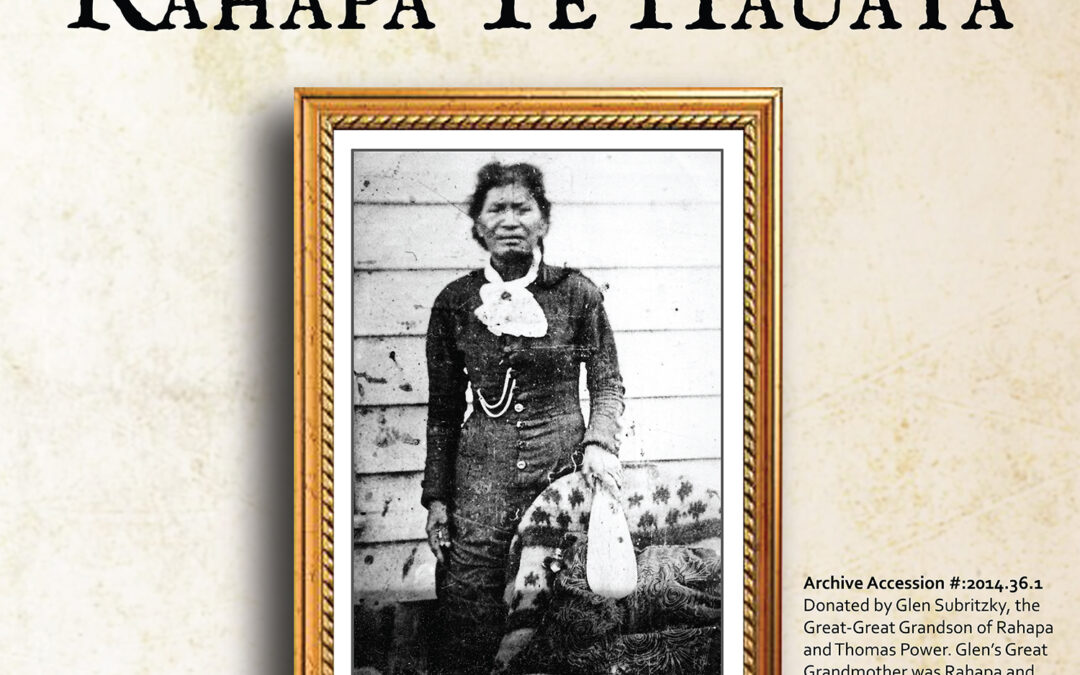Rahapa Te Hauata, Ngāti Apakura, pictured here holding a patu paroa whalebone club and wearing Victorian style dress. This photograph is from an original Tin-type and would have been taken in Rangiaowhia prior to 1864 when the area was prosperous. We’re not sure of the occasion, however, this photo and its subject holds significance to this district and Ngāti Apakura whānau whanui. Rahapa resided in Rangiaowhia, a thriving peaceful village a few kilometres east of Te Awamutu. The land was rich for agriculture with a very productive Māori mission. In the 1850’s it boasted one of the most industrious Māori -owned flour milling areas in the country.
In 1847, at the age of twenty-two, Rahapa married Irish-born farmer Thomas Power. Thomas was sent to Australia from his native Ireland in 1833 for sheep stealing. It is known he came to New Zealand around 1840, landing in Auckland, and made his way down country into the Waikato region. What is significant about this union is that it formed one of the first Māori-European families in the Waipā district.
Known for his agricultural skills, Governor Grey requested the couple work together to introduce local Māori to European farming practices. During the British invasion of the Waikato in 1864 Rangiaowhia was besieged. Rahapa and Thomas’ house was not attacked but afterwards, while Power was in Auckland with three of their five children, it was looted by soldiers.
He later charged Major Jackson of the Forest Rangers with trespass but lost the case as it was deemed that Rahapa’s land and house was part of Crown confiscations. Rahapa‘s account of events that took place at Rangiaowhia on and after 20th February 1864 deepens our perspective to the atrocities that happened.
Descendants of Rahapa and Thomas are still alive, some of which reside in the Waipā district today.
This is a translation of a letter, written in the Māori language, to His Excellency Sir George Grey by Father L. Vinay, Roman Catholic Priest at Rangiaowhia. As part of the British Crown invasion of the Waikato in 1864, Forest Ranges had sacked Rangiaowhia in February 1864. The letter is a heartfelt plea for help, describing in great depth the actions of soldiers upon Rahapa, her family, their house, stores and belongings during the taking of Rangiaowhia. In one part, Rahapa shares her dismay to a visiting Bishop, asking why soldiers would take her children’s books and clothes. Victims of Rangiaowhia fled to the Powers’ farm, and Rahapa describes the lack of support coming through for any of them. In fact at the end of this letter, it seems a year had now passed with still no help or communication about parcels of land in Rangiaowhia including the Power’s land, store and stock which had been part of the Forest Rangers soldiers compensation for their part in the invasion.
Rangiaowhia
April 20th 1865
To the Governor,
Friend the Governor, salutation to you this is my word to you that you may hear me.
On the 16th July 1863, my husband Thomas Power left here for town with three of our children, leaving me and two, the youngest, behind; we were living comfortably at our home when on the 21st February 1864, a Sunday, the soldiers arrived at Rangiaowhia in the morning. Being in bed with my children, I was awakened by the noise of the guns. I got up, when out and put up a white flag on the top of our wooden house, only a few of the soldiers came to our house this day, but on the following morning, Monday a good many came. They commenced killing our fowls and pigs. I saw a black man amongst them with a stick in his hand killing the fowls, they took away with them a good many of our pigs and fowls on this day. On Tuesday morning a large number of them came, part of them commenced killing our pigs and fowls, the remainder broke open the house and store, and took away a great quantity of goods After breakfast others came and took away more goods, after we had repaired the boards of the house and store, broken by the soldiers, we went into the kitchen, not long after, a large number came they again broke open the house and store, which we had just repaired, went in, broke open the boxes, took our goods and even books including the book of our land and account books. I was then so frightened, almost fainting, my children crying and I not knowing what would happen to us, the soldiers cursing at me and my children and threatening that if I complained against them to the Officers, they, the soldiers, would come at night and kill us. I said if they left in peace and would not return, I would not speak against them to the Officers.
After dinner a European named Robert Moore came and a gentleman with him. Moore said “this is the Colonel of the soldiers, he wishes you, and your children, to go to Te Awamutu, the General will take care of you there”, I asked how will my children do for food? Again, I am not strong to carry them there. Moore answered, “If you consent to go the Colonel will send a dray for them – the old blind man, his lame old wife, some of your things”, I then gave my consent to go. The Colonel wrote a note and gave it to me, saying, “If any more of the soldiers come here to trouble you, show them this note.” After the Colonel and Moore left, some of the soldiers came. I showed them the Colonel’s note, a few of them remained to read it, whilst the largest number of them rushed into the house to see what they could find.
On Wednesday Bishop Selwyn came to see us, after salutations, he said, “My daughter are you the only persons that now remains in all this settlement? I answered, “I am.” He then asked me “where have the people gone to”. I answered that the women went after their husbands and the children followed their mothers, and I do not know how far they are gone. He then asked me, “Do the soldiers come to trouble you at night?” I said, no, but they do in the day time. He asked what do they come here for, I answered, they come for our pigs and fowls, and that they broke open our house and store, and took our goods, but that worse than all they took my children’s clothing. The Bishop then asked me “were there many goods in the house and store when your husband went to town?” I answered, “a great deal of property.” The Bishop then asked me, “Did the Māoris take any of your goods before the soldiers arrived”. I answered, they did not, only what they paid for in the amount of seven pounds.
The Bishop then said, you had better come with me to the Colonel, and we will tell him what you have now told me. I said the Colonel and European named Robert Moore were here yesterday, and the Colonel told me that a dray would be sent up to take my children, the old blind man, his old lame wife and some of our things goods to Te Awamutu. The Bishop said. “Do you wish to go down there?” I asked if Hohaia there? He told me he was, but said he had the same dangers that is here, and another thing, there is no empty house, for they are all full of soldiers, and moreover if you leave here and go to Te Awamutu, the soldiers will then pull down your wooden house and destroy your fences, it is better for you to remain in your own house. The Bishop then asked me if I had any utu. I said, “I have utu”. He then wrote on the doors of the house. After he had done writing, he greeted us with ‘food life” (communion), and told us that God would protect us.
Now Governor that is all I have to say about the coming of soldiers to Rangiaowhia, and the trouble that they have caused to me and my children at our place. It is not all that, but now, me and my children, five in number, are crying to you, for you and the person in New Zealand to do justice to Europeans and Māori alike. And now I have to tell you, that all Rangiaowhia is to be given to strange Europeans in our place. Where is them. O Govenor, that land for us to cultivate, and grow food on for me and my children? I do not believe that you would let me die for want of land to grow food upon, that is the reason I now cry to you.
But before I finish, I would ask you what is to be come of the old blind man Pura and his lame old wife? For I am the only person who has supported them since the soldiers took Rangiaowhia, but now I cannot support them any longer, as the Government has taken my land from me, on which I was born and reared, and which also belonged to my forefathers before me, none of whom have at any time fought against our Queen’s soldiers.
Rahapa Te Hauata


